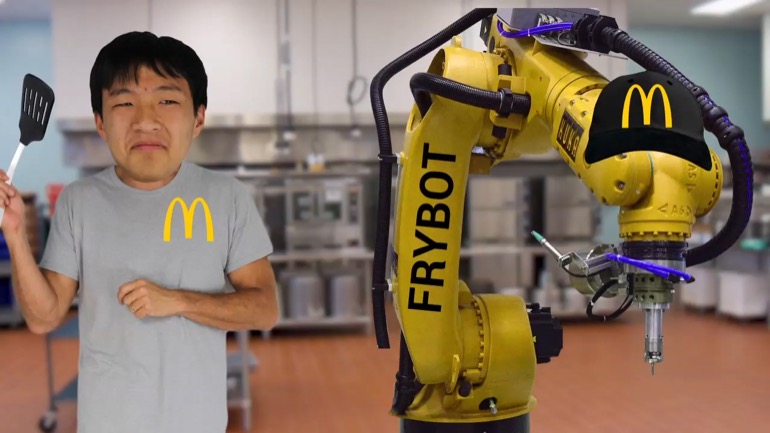ShmoopTube
Where Monty Python meets your 10th grade teacher.
Search Thousands of Shmoop Videos
Econ Videos 79 videos
What is a Production Possibilities Curve? The Production Possibilities Frontier Curve (PPF) is a statistical graphic curve that depicts the compari...
What are Income and Substitution Effects? Income effects reflects the increases or decreases in total consumption of goods and services in proporti...
How Do Companies Add Value? Companies add value by improving the client or customer experience. This can be achieved by offering better quality ser...
Econ: How does Technology Change Market Efficiency? 6 Views
Share It!
Description:
How does technology change market efficiency? Technology makes the market more efficient by giving investors the ability to execute trades in the market much easier and faster. Using computer systems to enter trades gives investors the ability to make trades at the exact price they wanted and gives them the details of their trade immediately. Technology also gives investors access to more information through financial research websites such that they can make more informed decisions before investing.
Transcript
- 00:00
And finance Allah shmoop What is technological change Well let's
- 00:08
see We all benefit from technology Just think about it
- 00:11
We're talking to you through time and space thanks to
- 00:14
a little thing called the Internet Yeah great No big
- 00:17
deal In economics technological change is used to describe anything
Full Transcript
- 00:21
that increases output without increasing input In other words technological
- 00:26
changes magic It's anything that makes creating economic value more
- 00:31
efficient like the Internet and computers are tools that we
- 00:35
often think of when we hear technology But changes in
- 00:37
processes count as technology as well For instance the invention
- 00:41
of the assembly line and great process there was first
- 00:44
put into play by Henry Ford in the late nineteen
- 00:47
twenties and it was the key to making mass production
- 00:50
possible By combining the use of machines with stationed workers
- 00:54
and interchangeable parts Ford was able to produce far more
- 00:58
vehicles with the same amount of inputs as before Even
- 01:01
hammers wristwatches and dialogue were once leading technological change Today
- 01:06
we've got self driving cars flying cars three D printing
- 01:10
and neural network development increasing market efficiency and well yes
- 01:14
Granted our relationship with technology has never been straightforward in
- 01:18
the case of the assembly line While workers in Ford's
- 01:20
factories did have better working conditions In some ways they
- 01:23
had worse working conditions In other ways workers didn't have
- 01:27
to do any heavy lifting or low stooping like they
- 01:29
did before And there were jobs almost anyone could dio
- 01:33
plus the assembly line allowed for to pass on some
- 01:35
of those efficiency gains from technological change to workers wage
- 01:39
improvements Despite these benefits the turnover at Ford's assembly line
- 01:43
jobs was incredibly high For a while workers could on
- 01:46
Lee do the mind numbing jobs for so long It
- 01:49
was also argued by Karl Marx that doing the same
- 01:52
little repetitive task over and over and over again made
- 01:55
it difficult for workers to feel like they were actually
- 01:57
contributing anything meaningful in their jobs Well guess what The
- 02:01
turnover at Ford's factories was so high that Ford decided
- 02:04
to give his workers two days off working only five
- 02:07
days a week eight hours a day What a concept
- 02:10
That's right The technological change of assembly lines lead to
- 02:13
increased market efficiency and supreme boredom among workers which then
- 02:17
led to the forty hour work week who go forward
- 02:21
Increasingly these repetitive type tasks are being done by advanced
- 02:25
robots Even more creative jobs like writing for shmoop and
- 02:29
making music composition are now being done by robots It's
- 02:33
nothing personal It just makes sense for business to use
- 02:35
more robots If doing so allows them to doom or
- 02:38
with less well as technological change progresses it's increasingly a
- 02:42
concern that robots will take up so many jobs There
- 02:46
won't be many left for a human Beings will have
- 02:49
a huge part of the workforce just permanently unemployed then
- 02:52
Plus most economic gains from technological change in the last
- 02:54
several decades haven't ended up in workers pockets which is
- 02:58
kind of a concern We've always had a love hate
- 03:00
relationship with technological change We love how easy it makes
- 03:03
our lives but sometimes it makes them too easy can't
- 03:06
live with robots and well can't live without him What
Related Videos
GED Social Studies 1.1 Civics and Government
What is bankruptcy? Deadbeats who can't pay their bills declare bankruptcy. Either they borrowed too much money, or the business fell apart. They t...
What's a dividend? At will, the board of directors can pay a dividend on common stock. Usually, that payout is some percentage less than 100 of ear...
How are risk and reward related? Take more risk, expect more reward. A lottery ticket might be worth a billion dollars, but if the odds are one in...



















































































